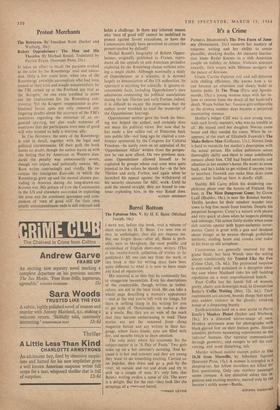Barrel Bottom
I HAVE not, before this book, read a volume of short stories by H. E. Bates. I've seen one or two, in anthologies, that did not impress me. But one forgot those—after all, Bates is prob- ably, next to Maugham, the most prolific and established of English short-story writers. (This is his twenty-fourth collection, of stories to be published.) All one can say from the work in this book is that his writing must have been quite different to what it is now to have made any kind of reputation.
His material is so thin that he continually-has to exaggerate inessentials. Even his descriptions of the countryside, though written in techni- colour, are not in the least vivid. He can take a whole page describing a woman's appearance —and at the end you're left with no image, for there is nothing sharp in his writing for you to get hold of. Occasionally he makes a shot at a simile. But they are so wide of the mark that they become embarrassing to read. These stories are not far removed from cheap magazine fiction and are written in their lan- guage, where faces freeze, eyes are filled with fire, and mouths twitch to show emotion.
The only story where his treatment fits the subject-matter is in 'A Pair of Fools.' Two girls wake up on a hot summer's morning. And be- cause it is hot and summer and they are young they want to do something exciting. Carried on an impulse, they dress and go a pub by the river, sit outside and eat and drink and try to pick up a couple of men. It's only here that Bates's writing evokes a sense of life. The story is a delight. But for the rest—they look like the scrapings of a ,,*.o'n-out barrel.
+TnRmAN LEVINE


































 Previous page
Previous page